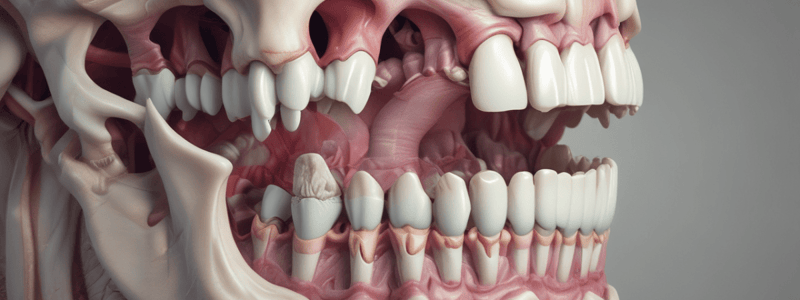Podcast
Questions and Answers
What is another term for the lower jaw?
What is another term for the lower jaw?
- Palatine
- Mandible (correct)
- Maxilla
- Temporomandibular
Which two types of teeth are specifically mentioned as being used for cutting?
Which two types of teeth are specifically mentioned as being used for cutting?
- Wisdom teeth and incisors
- Central and lateral molars
- Canines and premolars
- Central and lateral incisors (correct)
How many central incisors are there in a full set of adult teeth?
How many central incisors are there in a full set of adult teeth?
- 2
- 4 (correct)
- 8
- 6
What is the primary function of central incisors?
What is the primary function of central incisors?
What is the other name for the upper jaw?
What is the other name for the upper jaw?
In the context discussed, how are teeth arranged in relation to symmetry?
In the context discussed, how are teeth arranged in relation to symmetry?
Which statement is true about incisors in dentistry?
Which statement is true about incisors in dentistry?
What is the key term used to describe the action of cutting in relation to incisors?
What is the key term used to describe the action of cutting in relation to incisors?
How many canines do humans typically have?
How many canines do humans typically have?
What is the primary function of canines?
What is the primary function of canines?
What do the premolars primarily do?
What do the premolars primarily do?
What does the term 'mola' in the context of teeth refer to?
What does the term 'mola' in the context of teeth refer to?
How many molars does an average adult have?
How many molars does an average adult have?
What is a common nickname for third molars?
What is a common nickname for third molars?
How many premolars are present in a full set of adult teeth?
How many premolars are present in a full set of adult teeth?
What percentage of the population has a jaw structure identical to the one depicted in the common dental image?
What percentage of the population has a jaw structure identical to the one depicted in the common dental image?
What is the main type of action performed by the molars during digestion?
What is the main type of action performed by the molars during digestion?
Which teeth come before the molars in the dental arch?
Which teeth come before the molars in the dental arch?
What percentage of the population commonly has their wisdom teeth removed?
What percentage of the population commonly has their wisdom teeth removed?
Why do people experience issues with their wisdom teeth?
Why do people experience issues with their wisdom teeth?
At what age group do wisdom teeth typically begin to cause problems?
At what age group do wisdom teeth typically begin to cause problems?
What term is used to refer to the gums?
What term is used to refer to the gums?
What complications can arise from wisdom teeth attempting to erupt through the gingiva?
What complications can arise from wisdom teeth attempting to erupt through the gingiva?
What is the reason wisdom teeth are referred to as such?
What is the reason wisdom teeth are referred to as such?
What dental procedure is recommended to avoid complications related to wisdom teeth?
What dental procedure is recommended to avoid complications related to wisdom teeth?
What is the typical characteristic of the hole through which wisdom teeth try to erupt?
What is the typical characteristic of the hole through which wisdom teeth try to erupt?
Flashcards are hidden until you start studying
Study Notes
Overview of Teeth and Jaw Structure
- The lower jaw is known as the mandible.
- The upper jaw is referred to as the maxilla.
- Teeth are symmetrical; each type appears in both jaws.
Types of Teeth
-
Central Incisors
- Four total: two in the lower jaw and two in the upper jaw.
- Primary function: cutting food. The name "incisor" relates to making an incision.
-
Lateral Incisors
- Four total, similar to central incisors.
- Used for cutting as well.
-
Canines (Fangs)
- Four total; found between incisors and premolars.
- Longest and sharpest teeth, used for gripping food (e.g., tearing bread).
-
Premolars
- Eight total; two on each side of both jaws.
- Primary function: grinding food, derived from the Latin word "mola," meaning grindstone.
-
Molars
- Twelve total; three on each side of both jaws.
- Used for grinding food, similar function to premolars.
Wisdom Teeth
- Third molars are referred to as wisdom teeth.
- 72% of the population has their wisdom teeth removed.
- Commonly removed due to insufficient space in the gums for eruption, leading to potential complications like inflammation or infection.
- Eruption of wisdom teeth usually occurs between ages 17 to 25.
Dental Health Considerations
- Eruption issues arise when wisdom teeth attempt to grow through gingiva (gums), leading to pain and potential health risks.
- Regular dental check-ups using methods like X-rays can help monitor wisdom teeth development and prevent complications.
Interesting Dental Facts
- The typical textbook representation of the jaw is accurate for only 28% of individuals.
- The panoramic X-ray is a diagnostic tool for evaluating tooth alignment and wisdom teeth status.
Studying That Suits You
Use AI to generate personalized quizzes and flashcards to suit your learning preferences.


